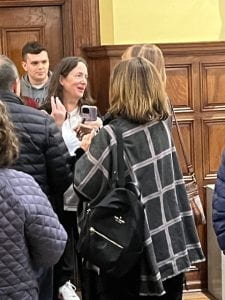Faith is the assurance of things hoped for, the conviction of things unseen. (Hebrews 11:1 – NIV)
In a lecture/ dialogue Monday night at Graham Memorial Chapel (Washington University), Heather Cox Richardson described our primary business in a democracy: to promote the idea that “all are created equal and have a say in our government.” She referred to that idea as “faith in democracy.”
And I was struck by how similar “faith in democracy” was to faith in the religious context, because “Faith is the assurance of things hoped for . . .” Democracy continues to be an aspirational form of government, because it is challenged every day by those who want to use it for their own ends. This is not a political claim, because people on both ends of the political spectrum believe that democracy is on trial– just listen to the speeches on the stump of the Presidential campaign.
And some people of faith want to weaponize religion for their own agenda. It means making unholy alliances with political movements to advance a religious cause. As Dr. Richardson urged, “Your politics should be informed by your faith, but it should not be used to garner power.” Just as religion is about the acquiring of faith, politics is about the acquiring of power. Religion should not be about the acquisition of power.
Faith is “the assurance of things hoped for.” It is not a bargain between religion and political parties, because partisan goals are political platforms, whereas religious goals are hopes yet unrealized. And religion was never intended to arm itself with political causes: look at (many of) the Crusades; the Catholic Inquisition; the Thirty Years’ War; the established churches in Europe before the American Revolution; the uneasy alliance between Christian churches and the Nazi regime of World War II. These were not the churches’ finest hours.
Those dark hours could be relived in a corrupted vision of American democracy. Those who believe the wall between church and state was not preserved in the Bill of Rights have no good designs on faith or democracy. They are using both faith and democracy to weaponize each other. It is not a good design for churches or political parties. It is corruption of both the sacred and the secular. In the word of Jesus, “Give, therefore, to the emperor the things that are the emperor’s and to God the things that are God’s”(Matthew 22:21-22, NIV).
Dr. Richardson encouraged her audience to oppose the narratives of theocracy (merging of church and state) with their own narratives, whether political or religious. The counter-narrative of faith, whether in God or in democracy, opposes the deceptive narrative of Christian nationalism currently on the rise. Stories have power to disentangle the twisted narrative of a nation founded under one religion.
In our church this summer we began to write “faith stories,” a genre of personal writing meant to explain why we believe as we do. They are not so much “testimonies” as stories that illustrate the differences between faith experiences and “ordinary life,” stories that confirm or strengthen our beliefs. They are as diverse as the people that write them. Most of all, they are narratives that we can share with anyone who wants to know why we believe as we do. I can not share them here, because I do not have permission, but I will try to make some of them available, if anyone is interested.
We are not really evangelists, but we want to be articulate to share a story of our “conviction of things unseen.” I cannot doubt but what we share about our faith would apply to what might be shared about faith in democracy. Why is democracy, in the words of Abraham Lincoln, “the last best hope of earth” ? (Annual Address to the U.S. Congress, 1 December 1862). Many of us could echo the words of Lincoln, and it would be interesting to think and write about why we believe what we do.
Belief in democracy is not a partisan cause, but it can be corrupted for private purposes, religious or otherwise. It remains for those who can frame the story of why they believe to share with the overwhelmed and hopeless. Those with the “assurance of things hoped for” have a lot to offer.
